
Welcome to Meet The Need NC’s monthly newsletter featuring what the initiative is up to and how you can join our efforts to meet the service and supports needs of North Carolinians with intellectual or other developmental disabilities (I/DD) and their families.
This month’s topic: The DSP Workforce Crisis and Its Impact on Aging Caregivers
- Message from LAND, the Backbone of Meet The Need NC
- May Lunch & Learn Webinar Recap
- LENS: Lived Experience Network Speaks
- Hear. Share. ACT! Put Your Knowledge into Action
- Register for the July Lunch & Learn Webinar
- Meet The Need Initiative Update
- Let’s get social! Stay in touch with us on Facebook, Instagram and more!
Message from LAND, the Backbone of Meet The Need NC
North Carolina’s intellectual or other developmental disabilities (I/DD) community is facing a crisis that poses significant challenges to the care and support of those who make the choice to live in the community instead of in an institution. Like the aging community, there is a shortage of direct care workers. And this is increasing the number of family and other non-paid caregivers who must fill in because of the shortage. I/DD direct care workers are also called Direct Support Professionals (DSP).
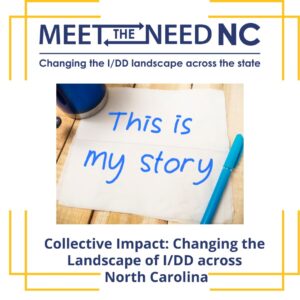 Compounding this workforce crisis is the increasing number of caregivers who are getting older and have traditionally provided care and support to someone with I/DD in their homes and other community-based settings. As these caregivers continue to provide care even into their 90s, concerns arise about who will assume the responsibility of caring for their loved ones in the future. Many caregivers are facing their own health challenges and may be unable to continue providing the level of care needed by individuals with I/DD. The ongoing DSP workforce shortage and over-reliance on aging family caregivers are putting a strain on the system and impacting the well-being of individuals with I/DD who rely on these essential services for their daily living needs.
Compounding this workforce crisis is the increasing number of caregivers who are getting older and have traditionally provided care and support to someone with I/DD in their homes and other community-based settings. As these caregivers continue to provide care even into their 90s, concerns arise about who will assume the responsibility of caring for their loved ones in the future. Many caregivers are facing their own health challenges and may be unable to continue providing the level of care needed by individuals with I/DD. The ongoing DSP workforce shortage and over-reliance on aging family caregivers are putting a strain on the system and impacting the well-being of individuals with I/DD who rely on these essential services for their daily living needs.
During May, members of Meet The Need NC had the opportunities to share stories from caregivers who are facing difficult decisions because of the DSP crisis. You will find more information about these collective impact projects in the May Lunch & Learn Webinar Recap and Meet The Need NC Initiative Update articles in this month’s newsletter.
Supporting caregivers through respite care services, caregiver training programs, and assistance in planning for the future care of their loved ones is crucial to ensuring continuity of care and support for individuals with I/DD. Collaborative efforts between policymakers, service providers, advocacy organizations, and community stakeholders are needed to develop innovative solutions that address both the DSP workforce shortage and the challenges faced by the aging I/DD community and their caregivers.
By prioritizing investment in the DSP workforce and supporting caregivers, we can create a more sustainable and inclusive system that meets the diverse care and support needs of individuals with disabilities throughout their lifetimes.
Cheryl Powell
LAND Member and Self-Advocate Co-Chair for the Lived Experience Network Speaks (LENS)
Meet The Need NC is an initiative to change the intellectual and other developmental disabilities (I/DD) landscape across the state and is funded by the North Carolina Council on Developmental Disabilities. Meet The Need NC is driven by the Leadership Alliance for Neurodevelopmental Disabilities (LAND), a program of the 501c3 nonprofit, Mental Health Transformation Alliance (MHTA). Learn more about LAND at https://mentalhealthtransformationalli.godaddysites.com/land.
May Lunch & Learn Webinar Recap
Double Whammy! Lifting the veil on the I/DD DSP Workforce shortage and its impact on NC’s aging family caregivers
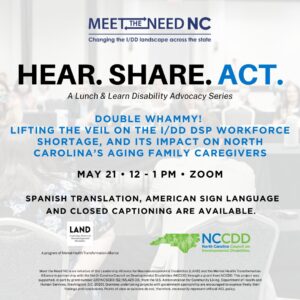 Meet the Need NC’s May Lunch and Learn Webinar brought in panelists to introduce plans, policy work, and personal perspectives on the pressing issue of the I/DD community’s Direct Support Professionals (DSP) shortage and its impact on aging caregivers who are left with providing the gaps in care. The webinar highlighted the importance of collective impact and that all voices matter in this fight for tackling the DSP workforce shortage crisis. Panelists included Talley Wells, NCCDD Executive Director; Betsy MacMichael, First In Families of NC Executive Director and parent; and Marjorie Serralle-Russell, NCCDD Council Member and parent.
Meet the Need NC’s May Lunch and Learn Webinar brought in panelists to introduce plans, policy work, and personal perspectives on the pressing issue of the I/DD community’s Direct Support Professionals (DSP) shortage and its impact on aging caregivers who are left with providing the gaps in care. The webinar highlighted the importance of collective impact and that all voices matter in this fight for tackling the DSP workforce shortage crisis. Panelists included Talley Wells, NCCDD Executive Director; Betsy MacMichael, First In Families of NC Executive Director and parent; and Marjorie Serralle-Russell, NCCDD Council Member and parent.
Talley Wells discussed “All Stages, All Ages NC,” the multi-sector plan to address the concern of the impact on those within the intellectual or other developmental disabilities (I/DD) community who have aging caregivers. The task force, brought together by Governor Cooper, lays out eight recommendations on how North Carolina should be meeting the needs of this demographic. Talley also touched on DSP workforce policy work, including the 2024 budget, current studies on DSP pay rates, and Essential Jobs, Essential Care.
Panelists had the opportunity to share their personal situations and views related to the workforce shortage. Cheryl Powell, Co-Chair of Lived Experiences Network Speaks (LENS) and a self-advocate, shared her experience as a person with I/DD. She fears what would happen if she no longer had her support system, and thus had her autonomy taken away at a nursing home or group home setting. She is a major advocate for empowering people with I/DD to be actively involved in their own future planning.
Betsy MacMichael, Executive Director of First In Families (FIF) of NC and Marjorie Serralle-Russell, NCCDD Council Member, are both mothers of an adult with I/DD. They worry about their children’s lives when they, the caregivers, are gone. A crisis could be just around the corner, and it is crucial to have a plan in place. Marjorie stated that educating people outside of the disability community is one of the most important steps in getting the 17,800 people off of the Waiver waitlist and receive much-needed supports and services.
Diane Coffey, Co-Chair of LENS, then facilitated an informative discussion to help attendees realize what key roles they need to take on to address aging-related challenges and what realistic measures they can take to advocate for change and support the disability community.
Cheryl concluded the webinar on a hopeful note, saying, “Remember that, even though it’s long, hard work, it will pay off…Stick with it and remember to love one another.”
Watch the Webinar!
Links to more resources from the webinar:
- Download the slides from Talley Wells, NCCDD Executive Director presentation
- Read our LENS Blog for more information and insights from Betsy MacMichael and Marjorie Serralle-Russell
- View the Spanish version of the webinar recording
LENS: Lived Experience Network Speaks
 LENS, which stands for Lived Experience Network Speaks, is a blog provided by Meet The Need NC from our LENS Advisory Group. LENS includes individuals with intellectual and/or developmental disabilities (I/DD) experience, including people with I/DD, families, and caregivers with separate groups for those who speak English or Spanish.
LENS, which stands for Lived Experience Network Speaks, is a blog provided by Meet The Need NC from our LENS Advisory Group. LENS includes individuals with intellectual and/or developmental disabilities (I/DD) experience, including people with I/DD, families, and caregivers with separate groups for those who speak English or Spanish.
We provide a space for them to share freely, but these opinions do not necessarily represent those of Meet The Need NC or all members of the LENS Advisory Group.
Caregivers Share Their Experiences, Hope and Fears
This month, we welcome two guest authors who are strong advocates and are also caregivers for a member of their family: Betsy MacMichael and Marjorie Serralles-Russell.
Message from Betsy MacMichael
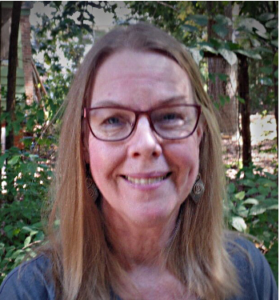 Our disability community is hanging on by a thread in a human service system marked by notable shortages.
Our disability community is hanging on by a thread in a human service system marked by notable shortages.
For 32 years I’ve given my all supporting our daughter Janie through all her life stages thus far. It’s like a signature project that my husband and I must do right … Because there is no choice when you love someone so deeply.
How am I? Chronically worried.
We’ve done the homework, we’ve acted, there isn’t much more we can do to plan for her life without us. She’s in the best situation we or she can imagine. But it’s not sustainable and here’s why. Supported Living as a service, with Self-Direction as a specific approach, has ensured most of her shifts are consistently filled with staff who understand that she (and I) are the boss. In the past, when using Supported Living but not Self-Direction, we went weeks between staff. If we died tomorrow, I know no one who would do Self-Direction, an unpaid part-time job. Her staff would take immediate pay cuts of around 40% and likely leave, exacerbating the crisis.
With this precarious reality, people must have specific “what if” plans in their ISPs (Individual Support Plan) for when caregivers are no longer available to help.
For people on the waitlist, we need care managers and others to have and use existing tools to help families begin to plan for the future.
Sudden crisis management is not efficient nor cheap. And it’s scary.
Our daughter is so amazing, while there are so many things she doesn’t understand. In fact we’ve been told through the years that she is functioning and performing above her IQ level. What does that even mean? What does it say about our system, if where and how people learn and live is driven by the lowest expectations based upon their assessed skills? What does that say about the belief that lots of people can’t live in the community? I don’t accept it. At First In Families (FIF) of NC we have seen and believe that there is no conscious person incapable of relationship. Behavior is communication, and we need to listen better.
With expectations of competence and opportunities for self-determined lives, many more people could be directly involved in their communities, not just those exceptional lucky folks deemed supposedly “less severe” or who managed to get a waiver slot. I’m not saying it’s the only way to live, but it’s got to be the default.
In summary, I’m still going strong, but it’s exhausting. I live in fear over sustainability, frustration that progress is so slow, and a certain guilt and sadness that so many families are suffering without services.
Thankfully, great people in positions of leadership are working hard and creatively to right the wrongs. The thing is, until we get the waitlist under control, we are in deep trouble. The DSP (Direct Support Professional) shortage must not be an excuse for not eliminating the waitlist. Tweaks and small increases in slots feel truly like rearranging the deck chairs on the Titanic.
About the author: Betsy MacMichael is the executive director of First In Families (FIF) of NC, Community Co-Chair of NC’s Olmstead Plan Stakeholder Advisory Group, and parent to an adult with I/DD. She has worked to promote self-determination, inclusion and positive community awareness for the past 30 years, personally and professionally. FIF helps families and individuals avoid and manage crises, identify goals and dreams, contribute to community life, and plan for the future. Betsy holds a Master’s Degree, lives in Durham, NC and has two daughters, one with I/DD who lives with a housemate in an inclusive neighborhood in Durham, NC.
Message from Marjorie Serralles-Russell
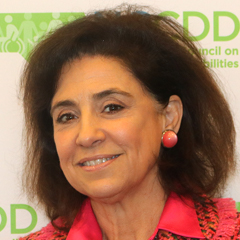 I’m Marjorie Serralles-Russell and I serve as the Policy Education Chair of the North Carolina Council on Developmental Disabilities.
I’m Marjorie Serralles-Russell and I serve as the Policy Education Chair of the North Carolina Council on Developmental Disabilities.
My son Spencer is 24 years old and lives at home with my husband and me. Spencer is an autistic young man waiting for services he desperately needs.
Spencer aged out of high school in June 2022 and being on the Innovations Waiting List, it has been a challenging time because there’s a sharp service cliff caused by students exiting school-based services to a very limited adult service system. While Spencer is on this waiting list, he is supposed to be receiving “SOME” partial services, but the REALITY is these services don’t get accessed due to providers saying they cannot find qualified Direct Support Professionals (DSPs) to provide the support.
For the times we have had the opportunity to access these partial services, we, as parents, identified the DSP for the provider agency. Nonetheless, the DSPs experienced delays from the provider training AND most recently the DSP had a four week delay in receiving their pay. So, the DSP did not stay for long.
Last month, I called our LME (local management agency) to check where Spencer stood on the waitlist. I learned that slots from November 2012 were currently being filled. Really! Slots from 12 years ago and Spencer has been on the waitlist for 7 years!
By the way, this wait list has existed for decades. So I ask: When is the disability community going to have their issues prioritized?
Meanwhile, Spencer IS experiencing significant regression.
He has no friends.
He retreats to his room and isolates himself.
He has gained significant weight.
In August 2023, we received the Eligibility Determination letter for 1915(i) services, and we have had care management services in place for over a year. Yet, Spencer basically has had two hours per week of Supported Employment services, which is NO different than he had more than a year ago. But hours have been spent creating and updating plans.
We are experiencing all of this WHILE we – the parents – are around. What is going to happen when we are no longer here? Spencer’s dad is 80 and he is extremely hands-on with Spencer BUT who is going to do what we do when we are gone?
As older parents, there is not a night that passes without worrying about how Spencer is going to be able to live. I know I am not alone with these FEARS.
About the author: Marjorie Serralles-Russell was born in Mexico City and grew up in Miami, Florida. She has a background in business, strategic planning and acquisition work. She is an attorney with an MBA and CPA. Marjorie has lived in Charlotte for 24 years. Her daughter is 25 and her son is 24. Marjorie has been involved in various non-profit organizations. She has been a Council member since 2020.
Hear. Share. ACT! Put Your Knowledge into Action!
The way Meet The Need NC works can be summed up in three words: Hear. Share. Act.
- The “Hear” comes from attending our monthly webinars.
- The “Share” comes from the information we provide in our monthly newsletter, and on Facebook and Instagram.
- And the “Act” is what this column is about.
This is where we provide information on an issue to educate and inform you about how you can be a part of making a difference. The issues we choose relate to our Vision and Mission for individuals with intellectual or other developmental disabilities (I/DD) and their families in North Carolina through a common agenda.

In the wake of our enlightening May webinar, we are left with a renewed sense of purpose and a call to action. The topic of people with intellectual or other developmental disabilities (I/DD) and their caregivers currently living in the midst of the shortage of Direct Support Professionals (DSPs) is one that touches many of us personally and deeply. It’s a subject that requires not just discussion, but also action. Here are some suggested action items you can undertake to make a difference.
Share Your Story
One of the most powerful ways to raise awareness about the challenges and triumphs of the issue is to share your personal story. Whether you are a person with a disability, a caregiver or you have witnessed the journey of a loved one, your story matters.
You can share your experiences on social media platforms, personal blogs, or even local community gatherings. Remember, your story could be the catalyst that inspires someone else to take action or provides comfort to someone going through a similar situation.
Contact Your Legislators
Policy change is a crucial aspect of improving conditions for people with I/DD and their caregivers. Reach out to your local, state and federal legislators to voice your concerns and suggestions. Advocate for policies that provide better support and resources for those with disabilities and their caregivers.
You can send emails, write letters, make phone calls, or schedule meetings with your representatives. Remember to be clear, concise, and passionate in your communication.
Educate Others
Spread the word about the issues that people with I/DD and their caregivers face. You can host informational sessions in your community, share resources online, or have conversations with friends and family. The more people are aware of these issues, the more support and success the disability community will receive.
As people with disabilities and caregivers, it’s important to remember that we are all getting older and life is not easy. Prioritizing our self-care is essential. This is a journey that lasts a lifetime. Let’s collectively ensure we are taking care of ourselves and each other.
Register for the July Lunch & Learn Webinar
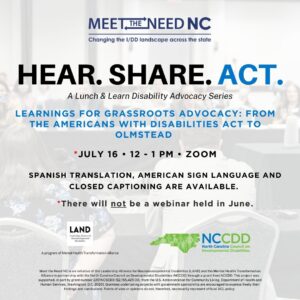 Join us on Tuesday, July 16th from 12PM to 1PM for our next Lunch & Learn Webinar. The topic is Learnings for Grassroots Advocacy: From the Americans with Disabilities Act to the Olmstead Decision.
Join us on Tuesday, July 16th from 12PM to 1PM for our next Lunch & Learn Webinar. The topic is Learnings for Grassroots Advocacy: From the Americans with Disabilities Act to the Olmstead Decision.
Note: There will not be a webinar held in June.
The meetings are held online via Zoom. Spanish translation, American Sign Language and Closed Captioning are available.
Did you miss a webinar? No worries! Check out our YouTube channel for recordings of previous webinars, including video clip highlights.
Meet The Need NC Initiative Update
What is Meet The Need NC all about? Download our MTN NC infographic to learn about our collective impact and how we work together with a common agenda to achieving our mission to meet the need for North Carolinians with I/DD and their families.Meet the Need NC is driven by the Leadership Alliance for Neurodevelopmental Disabilities (LAND), a program of the 501c3 nonprofit, Mental Health Transformation Alliance (MHTA).
Updates from MTN NC
Members of Meet The Need NC were part of collective impact in action at the May 14th I/DD Caucus Listening Session and Press Conference. NC General Assembly member Rep. Zack Hawkins (D – District 31) brought together the I/DD Caucus for a Listening Session with 20 people with I/DD lived experience. Self-advocates and parent advocates from across the state were able to give specific examples of how the long Innovations Waiver waitlist and lack of Direct Support Professionals is impacting them and their families. Our LENS advisory group helped to host the Listening Session.
We are seeing systems change across our state for our I/DD Community: disability groups working together collectively toward common goals, and the recognized, essential role of the person with lived experience driving the change.
Read a summary of the event from a press release release.
Watch the Event!
Let’s get social!
Want to stay informed about issues that are important to you and your community? Follow us and subscribe to our newsletter! Here’s where to find us:
- Follow us on social media on Facebook and Instagram.
- View our Lunch & Learn webinar recordings and other video clips on our YouTube channel.
- Listen to our podcast, The Waiting Room, hosted by Kenneth Kelty.
- Visit our website for updates, resources and links to other helpful websites.
- Join our email list to receive upcoming webinar registration information and our monthly newsletter.
Most importantly … share this information! Encourage others to subscribe to our newsletter and follow us on social media so they, too, can be part of Meet The Need’s vision and mission to change the I/DD landscape across North Carolina through a common agenda. Together, we can make it happen!
